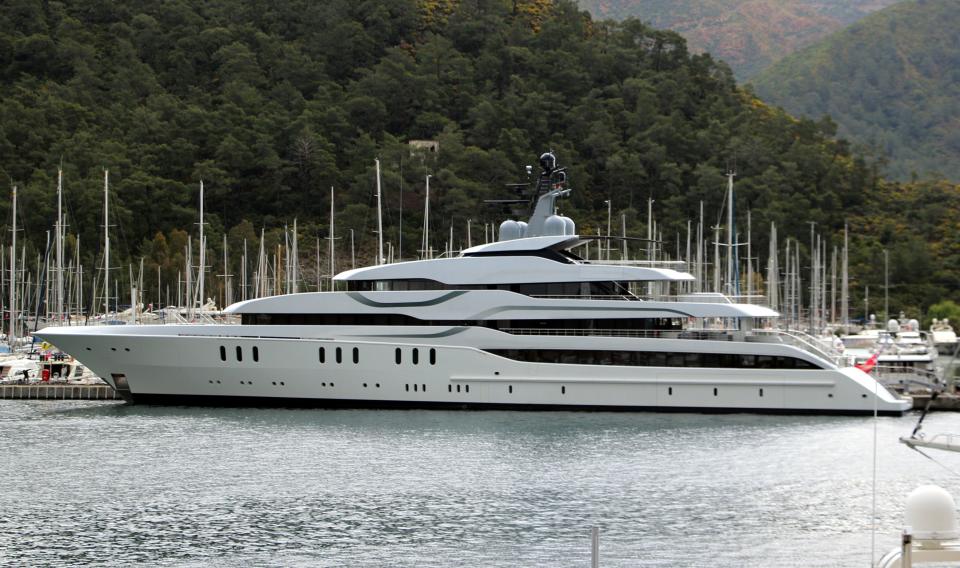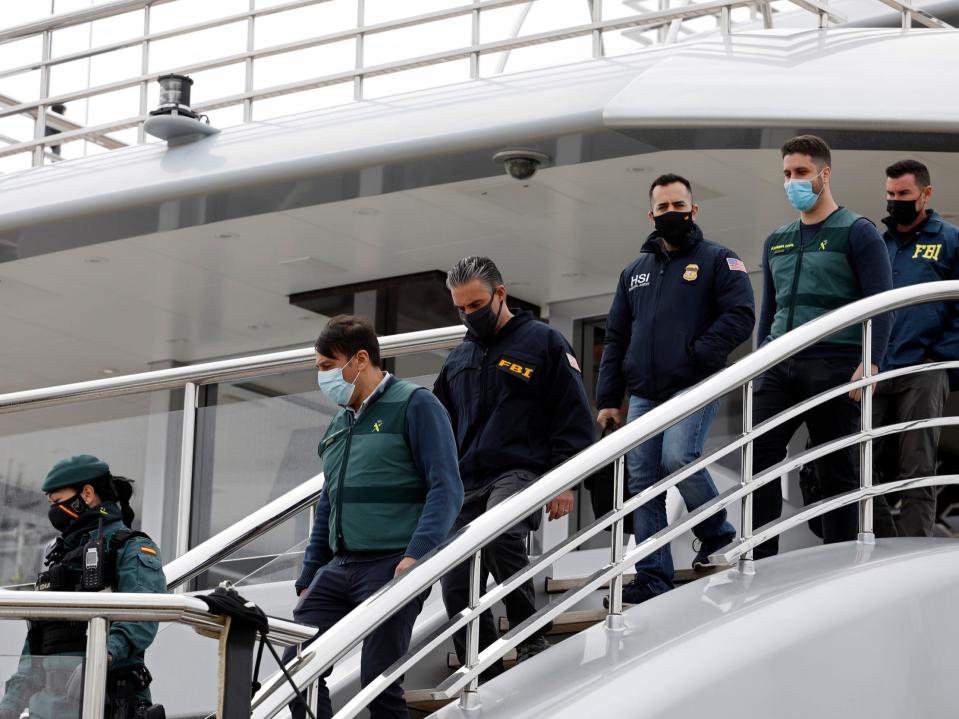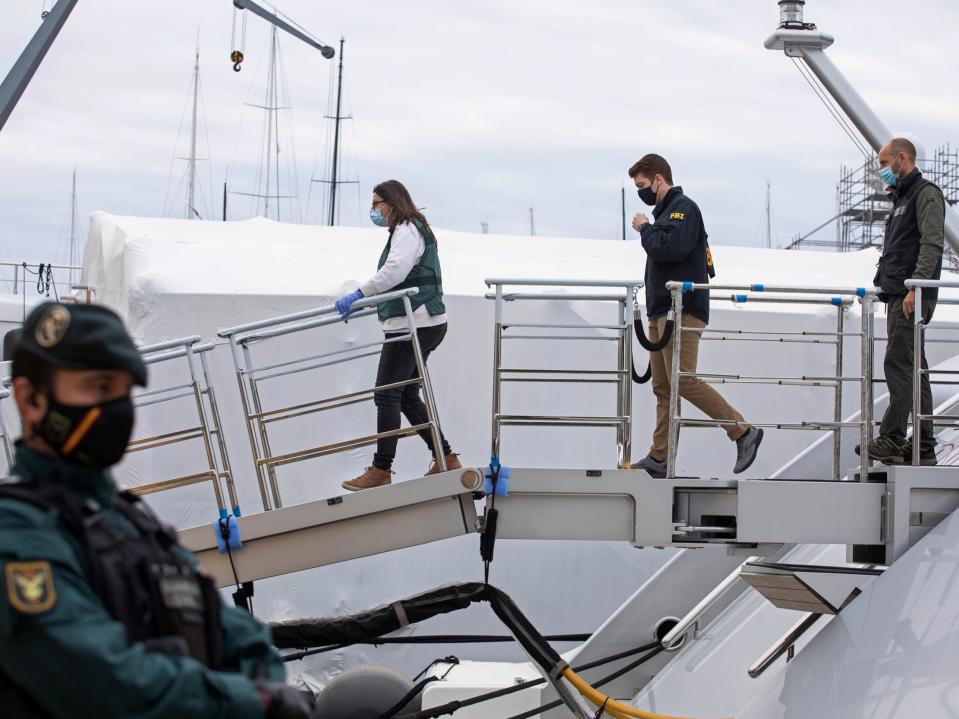The United States vs. a yacht: How the government can take a Russian oligarch's $90 million superyacht
- Oops!Something went wrong.Please try again later.
- Oops!Something went wrong.Please try again later.
The US seized a Russian oligarch's superyacht for the first time this week.
The process of civil asset forfeiture lets the Justice Department sue objects and take them.
But the government has to pay for upkeep while the case goes through the courts.
On Monday, US federal agents, working with Spanish authorities, seized a 255-foot, $90 million superyacht belonging to Viktor Vekselberg, a billionaire and ally of Russian President Vladimir Putin.
The seizure was part of "Operation KleptoCapture," the US Justice Department announced. Working with the Treasury Department and allied countries, prosecutors are investigating and prosecuting oligarchs who break laws connected to new US sanctions following Russia's invasion of Ukraine.
For weeks, countries like France, the United Kingdom, and Italy have made showy yacht seizures, raiding them for computers and closing them off as their suspected oligarch owners are slapped with sanctions.
In the United States, seizing a yacht is a little less straightforward.
First, you must sue the yacht.
The United States vs. a yacht
The seizure of Vekselberg's yacht, named the Tango, was part of a process called civil asset forfeiture.
Prosecutors determine that some property — in this case, a yacht, but it could be something like a pile of cash, a car, or a house — was instrumental in illegal activity or was purchased from the profit of a crime. Prosecutors then ask a judge to sign a warrant for a seizure, which permits them to take it.
Civil asset forfeiture is an especially useful legal instrument for when prosecutors want to go after people living in other countries. If a criminal case were filed against a foreigner, they can simply stay out of the US or countries with US extradition treaties.
Criminal asset forfeiture can only be used upon a conviction. And if a person can't stand trial, they can't be convicted.
So, we have civil asset forfeiture.
The rationale for seizing Vekselberg's yacht was laid out in court documents made public Monday and reviewed by Insider. The yacht itself is a defendant in the case, titled "In the matter of the seizure of the motor yacht Tango, with International Maritime Organization Number 1010703." If Vekselberg wants his yacht back, he'll come into the case as a claimant — not a defendant.

An FBI affidavit filed to court said the Tango was at the center of a bank fraud and money laundering conspiracy. Prosecutors accused Vekselberg and unnamed co-conspirators of structuring payments regarding the boat in a way that obscured the oligarch's ownership, thereby avoiding transaction reporting requirements.
"Bank records received by law enforcement show that, prior to being sanctioned by the Treasury Department, Vekselberg made U.S. dollar payments from accounts in his own name to Arinter and its managers," the FBI agent wrote, referring to a holding entity for the yacht. "These payments are consistent with Vekselberg being the true owner of the TANGO."
The US has had sanctions against the Ukraine-born Vekselberg and his company, the Moscow-based Renova Group, since 2018.
But the Constitution's Fourth Amendment doesn't allow the US government to take things belonging to oligarchs just by putting them on a sanctions list.
What Operation KleptoCapture does, according to Duncan Levin, a former prosecutor specializing in money laundering and asset forfeiture cases, is train the Justice Department's resources toward sanctioned oligarchs who may have disguised their forbidden financial transactions.
"It is not illegal to be an oligarch," Levin, an attorney at Tucker Levin PLLC, told Insider. "It is illegal to commit crimes, including some that take place outside the United States."
Fortunately for prosecutors investigating Russian oligarchs, money laundering gives "a lot of wiggle room" for the types of assets that can be seized in connection to the alleged crime, according to Sarah Krissoff, a former federal prosecutor overseeing complex financial investigations.

"The statutes are pretty vast," Krissoff, an attorney at Day Pitney, told Insider. "That's definitely where I would work if I was a prosecutor and trying to get at some of these assets."
Your tax dollars will pay for the yacht's upkeep
So, how does one seize a yacht?
In the case of the Tango, which is docked in Palma de Mallorca, US authorities asked Spanish authorities for help. A video the Justice Department published shows agents from the FBI, Department of Homeland Security, and Spain's interior ministry boarding the yacht and entering the control room.
—Jacob Shamsian (@JayShams) April 4, 2022
When the federal government seizes something, it goes under the control of the US Marshals Service. They're in charge of making sure the property is kept in good condition. For the Tango, they have a gym, elevator, beach club, and beauty salon to worry about.
"If there's something that has to be done, like make sure the property doesn't flood or make sure the water's turned off in the winter or something — that's the Marshals' responsibility," Krissoff told Insider. "So that can get very complicated for a yacht."
The US Marshals Service has a huge network of private contractors they work with to take care of upkeep. For complicated assets like a plane, yacht, or artwork, it'll probably be a contractor doing the day-to-day work rather than actual marshals. Cars are often held in specialized lots, and boats may be placed in dry docks to make maintenance easier.

The Justice Department said in a statement Monday that the yacht is still in Palma de Mallorca. It might just stay there. Owners of seized assets, in many cases, may still be able to use them until litigation is complete. Prosecutors might just make an on-paper seizure with the intent of selling it down the line.
It could take years for a forfeiture case to make its way through the courts, and the scope of the owner's use is often negotiated, Krissoff said. The court records for the Tango seizure are still sealed, and it's not clear if prosecutors have talked with Vekselberg (or his lawyers) about what they'll do with the yacht.
All of the experts who spoke with Insider mentioned the saga of 650 Fifth Avenue, a Manhattan skyscraper.
The US Attorney's office in Manhattan tried to seize it in 2008, alleging it was partly owned by a sanctioned Iranian bank. It took until 2017, when a jury agreed with the prosecutors' case, for the seizure to move forward — but the moves were thwarted in 2019 when the jury verdict was overturned upon appeal.
Having the US Marshals Service take care of a skyscraper for 11 years only to lose the case would have been a financial debacle. For something like a yacht, the Justice Department might allow Vekselberg to continue paying for the upkeep instead of the US government.

In some cases, prosecutors can apply for "interlocutory sale," Levin said, where they'd sell the asset. It's an option they consider when properties are expensive to maintain or would diminish in value.
"They'd take the yacht, they'd sell it, and they'd hold the money in an escrow account," Levin said. "And then they'd seize the money in lieu of the yacht. And if they lost the case, they would give the money back."
If that were to happen, whoever bought the yacht would get to keep it.
Seizing a yacht may make a difference in Ukraine
Vekselberg is worth $16.6 billion, according to Bloomberg. A yacht worth an estimated $90 million, at the end of the day, is a little more than half a percentage point of his estimated net worth.
According to Juan Zarate, who oversaw the George W. Bush administration's efforts to seize Saddam Hussein's assets, the new wave of sanctions is unlikely to have an immediate effect on the war in Ukraine. Seizing one of Putin's associate's yachts isn't going to stop a bombing campaign.
But the cumulative effect of sanctions — and the signal that the US is willing to go to great lengths to enforce them — can be "incredibly painful" in the long term, Zarate said.
"There's a mismatch of the expectations of what these kinds of cases can do in the short term versus what they do in the long term, which is to constrain the ability of these oligarchs to operate freely and comfortably, and the psychology around that," Zarate told Insider.
Operation KleptoCapture comes amid calls to seize yachts, apartments, and other flashy luxuries flaunted by ultrawealthy Russian nationals believed to profit from the country's corruption.
There's also the REPO — short for Russian Elites, Proxies, and Oligarchs — task force between the Justice and Treasury departments to enforce sanctions connected to the Ukraine invasion.

"Nothing's gonna be a silver bullet and nothing's gonna solve the problem with Putin wanting to invade a neighbor, but it is part of an effort to pressure and to isolate," Zarate said.
According to the FBI affidavit, Vekselberg's Renova Group is complicit in "the threat posed by the actions and policies of certain persons who had undermined democratic processes and institutions in Ukraine; threatened the peace, security, stability, sovereignty, and territorial integrity of Ukraine; and contributed to the misappropriation of Ukraine's assets."
The FBI affidavit accuses the company of other nefarious misdeeds. It says that Vekselberg and associates have been accused of using "armed soldiers and corrupted Russian court proceedings" to gain control of a Siberian oilfield, and plundered a bank to buy Faberge eggs, according to reports. Executives at his companies have been arrested on bribery charges, as well.
The selection of Andrew Adams — an experienced corruption prosecutor who oversaw transnational crime, asset forfeiture, and money laundering at the US Attorney's office in Manhattan — to lead Operation KleptoCapture signals just how serious the US government is about going after oligarchs' assets, Krissoff said.
Adams' team was famous for being "remarkably creative" in building forfeiture cases, something that will come in handy as the task force goes after everything from yachts to cryptocurrency, she said.
"They're used to looking at complicated ownership structures," Krissoff said. "They're used to situations where it's very muddy, how the asset was procured. They're used to finding creative ways for identifying ownership of the asset."
Read the original article on Business Insider

